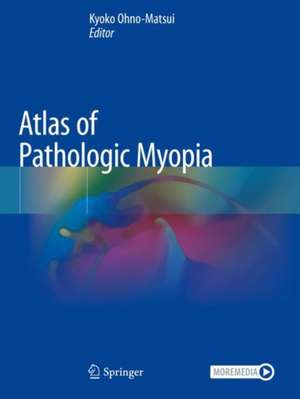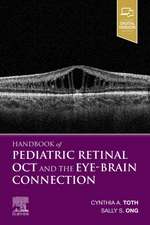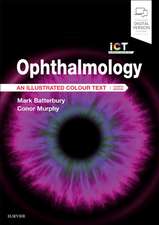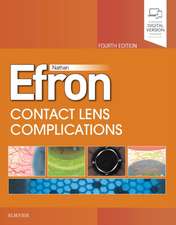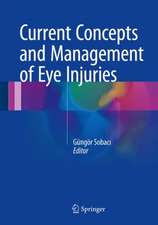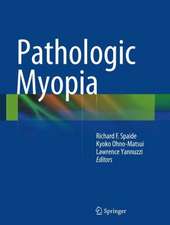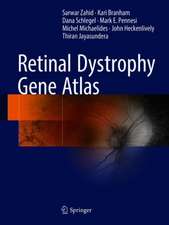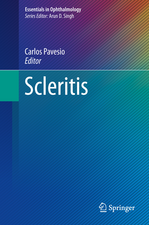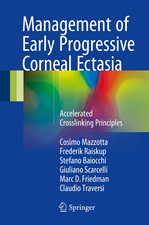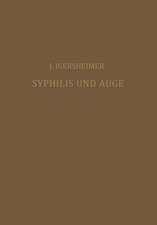Atlas of Pathologic Myopia
Editat de Kyoko Ohno-Matsuien Limba Engleză Paperback – 27 sep 2021
Recent advances in imaging technologies have yielded many new observations and allowed us to detect new lesions, e.g. myopic traction maculopathy (or macular retinoschisis) and dome-shaped macula. An especially interesting aspect: the images obtained by ‘3D MRI of the eye’ and ‘ultra wide-field OCT’ to visualize staphylomas. These techniques were established by the editor’s group and make it possible to record the entire shapes of the eye, offering a scan width of up to 23 mm and scan depth of 5 mm. They have since been used to visualize posterior staphyloma, which was previously impossible to view because it spanned such a wide range of the eye. In addition, readers will learn what types of eye deformity occur in pathologic myopia and how they damage the macula/optic nerve.
With this Atlas, readers will learn how to accurately diagnose each lesion of pathologic myopia, how eye deformity causes blinding complications, and how to identify patients with a poor prognosis. In short, it provides essential information that can’t be found elsewhere.
| Toate formatele și edițiile | Preț | Express |
|---|---|---|
| Paperback (1) | 837.50 lei 38-44 zile | |
| Springer Nature Singapore – 27 sep 2021 | 837.50 lei 38-44 zile | |
| Hardback (1) | 1426.93 lei 3-5 săpt. | |
| Springer Nature Singapore – 27 sep 2020 | 1426.93 lei 3-5 săpt. |
Preț: 837.50 lei
Preț vechi: 881.58 lei
-5% Nou
Puncte Express: 1256
Preț estimativ în valută:
160.27€ • 166.31$ • 133.96£
160.27€ • 166.31$ • 133.96£
Carte tipărită la comandă
Livrare economică 11-17 martie
Preluare comenzi: 021 569.72.76
Specificații
ISBN-13: 9789811542633
ISBN-10: 9811542635
Pagini: 202
Ilustrații: X, 202 p. 215 illus., 167 illus. in color.
Dimensiuni: 210 x 279 mm
Greutate: 0 kg
Ediția:1st ed. 2020
Editura: Springer Nature Singapore
Colecția Springer
Locul publicării:Singapore, Singapore
ISBN-10: 9811542635
Pagini: 202
Ilustrații: X, 202 p. 215 illus., 167 illus. in color.
Dimensiuni: 210 x 279 mm
Greutate: 0 kg
Ediția:1st ed. 2020
Editura: Springer Nature Singapore
Colecția Springer
Locul publicării:Singapore, Singapore
Cuprins
Chapter 1. Definition of pathologic myopia (PM).- Chapter 2. Overview of fundus lesions of PM, including staphyloma, myopic maculopathy, traction maculopathy, optic neuropathy, dome-shaped macula.- Chapter 3. Posterior staphyloma.- Chapter 4. Myopic maculopathy.- Chapter 5. Myopic traction maculopathy.- Chapter 6. Dome-shaped macula.- Chapter 7. Optic disc changes (megalodisc, optic disc pits, conus pits, ICC, extreme tilting of disc, large gamma zone).- Chapter 8. Long-term progression of fundus changes; summary and flow charts.
Notă biografică
Kyoko Ohno-Matsui, MD, PhD
Kyoko Ohno-Matsui is Professor and Chairperson of the Department of Ophthalmology and Visual Science at Tokyo Medical and Dental University (TMDU). She is also Chief of the Advanced Clinical Center for Myopia. She graduated from Yokohama City University Medical School and received her Ph.D. at Tokyo Medical and Dental University. She did her postdoctoral fellowship at Wilmer Eye Institute at Johns Hopkins University.
Textul de pe ultima copertă
This Atlas provides many beautiful images obtained with state-of-the-art technologies, including optical coherence tomography (OCT), OCT angiography, fundus autofluorescence, and wide-field fundus imaging, as well as traditional images and fluorescein/ICG angiograms. Gathered at the world’s largest High Myopia Clinic, the images are based on the long-term follow-up data of more than 6,000 patients from Japan and abroad.
Recent advances in imaging technologies have yielded many new observations and allowed us to detect new lesions, e.g. myopic traction maculopathy (or macular retinoschisis) and dome-shaped macula. An especially interesting aspect: the images obtained by ‘3D MRI of the eye’ and ‘ultra wide-field OCT’ to visualize staphylomas. These techniques were established by the editor’s group and make it possible to record the entire shapes of the eye, offering a scan width of up to 23 mm and scan depth of 5 mm. They have since been used to visualize posterior staphyloma, which was previously impossible to view because it spanned such a wide range of the eye. In addition, readers will learn what types of eye deformity occur in pathologic myopia and how they damage the macula/optic nerve.
With this Atlas, readers will learn how to accurately diagnose each lesion of pathologic myopia, how eye deformity causes blinding complications, and how to identify patients with a poor prognosis. In short, it provides essential information that can’t be found elsewhere.
Caracteristici
Features a wealth of images from the world’s largest high myopia clinic
Images were obtained with state-of-the-art technologies
Includes treatment indications and outcomes with numerous case series
Visualizes Posterior staphyloma using ‘3D MRI of the eye’ and ‘ultra wide-field OCT’
Images were obtained with state-of-the-art technologies
Includes treatment indications and outcomes with numerous case series
Visualizes Posterior staphyloma using ‘3D MRI of the eye’ and ‘ultra wide-field OCT’
